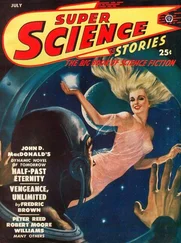Джон Макдональд - More Good Old Stuff
Здесь есть возможность читать онлайн «Джон Макдональд - More Good Old Stuff» весь текст электронной книги совершенно бесплатно (целиком полную версию без сокращений). В некоторых случаях можно слушать аудио, скачать через торрент в формате fb2 и присутствует краткое содержание. Город: New York, Год выпуска: 1984, ISBN: 1984, Издательство: Alfred a Knopf, Жанр: Детектив, на английском языке. Описание произведения, (предисловие) а так же отзывы посетителей доступны на портале библиотеки ЛибКат.
- Название:More Good Old Stuff
- Автор:
- Издательство:Alfred a Knopf
- Жанр:
- Год:1984
- Город:New York
- ISBN:978-0-394-53898-3
- Рейтинг книги:4 / 5. Голосов: 1
-
Избранное:Добавить в избранное
- Отзывы:
-
Ваша оценка:
- 80
- 1
- 2
- 3
- 4
- 5
More Good Old Stuff: краткое содержание, описание и аннотация
Предлагаем к чтению аннотацию, описание, краткое содержание или предисловие (зависит от того, что написал сам автор книги «More Good Old Stuff»). Если вы не нашли необходимую информацию о книге — напишите в комментариях, мы постараемся отыскать её.
In short, here is one of America’s most gifted and prolific storytellers at his early best — a marvelously entertaining collection that will delight Mr. MacDonald’s hundreds of thousands of devoted readers.
More Good Old Stuff — читать онлайн бесплатно полную книгу (весь текст) целиком
Ниже представлен текст книги, разбитый по страницам. Система сохранения места последней прочитанной страницы, позволяет с удобством читать онлайн бесплатно книгу «More Good Old Stuff», без необходимости каждый раз заново искать на чём Вы остановились. Поставьте закладку, и сможете в любой момент перейти на страницу, на которой закончили чтение.
Интервал:
Закладка:
Of course, there is always the secret landing by night from a small boat. But then the wheels of bureaucracy grind out the little pink and green forms — work permits, income taxes, census — and it is as though your coming and your forced departure and your name and your secret were written across the sky for all to see.
Even so, it is easier to hide from a government than it is to hide from a man.
Jan Dalquist, riding placidly up Canal Street in the back seat of the taxi, recognized this fact. Particularly if the hunter is provided with adequate funds. The hunter doesn’t have to be clever. Jan Dalquist knew his own faults. He wasn’t clever. He was dogged, painstaking, stubborn, silent and grim. Not clever. Not clever at all.
But he was an excellent hunter of men.
The huge net of the justice that the democracies dropped over France and Germany after the war was a net of compromise. The diameter of the mesh had to be small enough to entrap the major and intermediate beasts who walked like men. But it could not be so small that it would seine in millions, who, by burdening the mechanism of justice, would make fair trial impossible. As a consequence, thousands of vicious little men had slipped through the meshes and scattered across the world.
Jan Dalquist had been after one of these men for a year.
He was not employed by any government. He was paid by a small group of French industrialists: men who had been beaten to the earth by the German occupation, men who had not known how to compromise, men who thirsted for revenge in the calm, unemotional manner of a banker collecting a debt. They paid for the hunting of other Frenchmen. They were well satisfied with Jan Dalquist. They paid well for the service of a reliable assassin.
Jan Dalquist was after a Jean Charlebois. The facts were very simple. At the time of the Allied invasion, a large band of Maquis were wiped out by German troops. A betrayal was suspected. Only three of the Maquis escaped. Later, after the town was captured, German records indicated that the betrayal had been engineered by one Jean Charlebois, one of the three who had escaped. The son of one of the industrialists who financed Dalquist had been killed in the raid. Thus the assignment to find and kill Charlebois.
The industrialists had little patience with the slow machinery of government. So Jan Dalquist, who had lived in France before the war, and who had gone back during the war as an operative — air-dropped — was contacted and hired as a trustworthy killer.
Had they asked him a bit earlier, or a bit later, he would have refused — for he recognized that he was a man with a profound distaste for taking the tools of justice in his own hands, for acting as judge, jury and executioner. But the offer was made while Dalquist was still in an army hospital where a clever surgeon was attempting to make the ragged flesh and shattered bones of his hands resemble fingers, trying to cover the bone-deep burns on the soles of his feet with skin grafts from the insides of his thighs.
The memory of the basement room in Gestapo headquarters was too vivid. And so Dalquist had said yes. And having once agreed, it was not in him to back out until the job had been completed.
They gave him three names. Dalquist had found the first traitor in Brazil after nine months of search. He still awakened in the middle of the night, seeing again the death of the first. He remembered the man’s hand most of all. It had happened in a field outside of Belém. Long after the man had appeared dead, the hand scrabbled at the white dust.
He had found the second one in Montreal after another seven months. The ice was thin on the river. Almost transparent. After he had shoved the body down through the hole he had stamped through the ice, he saw it being borne away by the current, turning lazily so that once the misty face was turned toward him, the eye sockets dark under the film of ice.
And he often dreamed of this, too.
The taxi arrived at the hotel and he registered and followed the boy up to his room. He tipped the boy, locked the door and stood for a long time at the window, his mutilated hands shoved deep in his pockets, staring down fourteen stories at the busy New Orleans streets. A square, quiet man with a grave face which held a look of suffering. He looked across the gilded channel of Canal Street, looked into the narrow streets of the French Quarter. Jean Charlebois might yet be there. If so, it was the end of the third search, the end of the mission. But he wouldn’t permit himself to think of what he would do once Charlebois had been found and punished. Such thoughts would dilute resolve.
He unlocked his bag, took out the small black notebook. He sat on the edge of the bed and examined, with little interest, the record of the search for Charlebois. The man had escaped the consequence of his treachery for two and a half years. There was very little writing on the sheet.
Jean Charlebois left France on foot, crossing into Spain. He remained in Barcelona for three months, perfecting his Spanish and obtaining a passport as a Spanish citizen. He took the name of Ramón Francesco. With a Portuguese visa, he went to Lisbon. He remained there four months, and booked illegal passage on a Portuguese freighter, debarking in Guatemala. He dropped out of sight, reappearing in Mexico City. During the time he was out of sight he assumed the name Pierre Duval. Crossed the Mexican border into Texas illegally in December 1947.
Was unable to locate him until I intercepted a letter he wrote to a Mexican girl in Mexico City. Letter stated that he was working as waiter in a café called the Ancient Door on Burgundy Street in French Quarter of New Orleans. Have arrived in New Orleans twenty-four days after the letter was written. Believe that he is still in the city.
Jan Dalquist slapped the book shut and put it back in the suitcase.
He sat, studying his hands, rubbing the numb tips of his fingers together, looking at the places where there should have been fingernails. There was no sense of accomplishment in him. Only fear. And not of Charlebois. It was an odd fear. It was as though, three years before, in a basement room in Gestapo headquarters, he had ceased to exist. He had become a machine, dedicated to the wishes of a small group of bitter men.
This was the last case. After it was over, he would have to find himself again. There would always be men who would pay him to hunt other men. But that wasn’t the answer. He knew that the two and a half years of constant search, of sudden violence, had deadened him, soured him. No, that wasn’t the answer. He began to think of himself working with moist earth and growing things, with placid acres on which the sun beat and the rains fell. He could almost smell the rich loam.
After his shower, he strapped on the shoulder holster, checked the clip on the .32 automatic and snapped it into place. It made no visible bulge under the dull gray suit. He sighed heavily, and left the hotel, walking toward Burgundy Street. As he walked, he carried in his mind the accurate picture of Jean Charlebois.
Five foot nine. One hundred and thirty-five pounds. Dark, thinning hair. Sallow complexion. Heavy eyebrows. Gold cap on right eyetooth. Nervous, agile, quick. High voice. Neat and clean. A chaser of women. Likes jewelry. May have small mustache. Weak eyes, but unlikely to wear glasses.
The late sun was gone and the lights were beginning to click on. Jan Dalquist walked through the dusk, feeling at each step the little bite of pain at the soles of his feet — the pain that would be with him until he died. And, in his heart, he carried another type of pain — the pain of an intelligent and civilized man, a man of intuitive delicacy, who has been thrown up against the most brutal and animal aspects of war; who, having discovered that the battle must be fought on the brute level, has made the tools of violence his own, has learned to use them with an incredible efficiency because they are foreign to his essential nature.
Читать дальшеИнтервал:
Закладка:
Похожие книги на «More Good Old Stuff»
Представляем Вашему вниманию похожие книги на «More Good Old Stuff» списком для выбора. Мы отобрали схожую по названию и смыслу литературу в надежде предоставить читателям больше вариантов отыскать новые, интересные, ещё непрочитанные произведения.
Обсуждение, отзывы о книге «More Good Old Stuff» и просто собственные мнения читателей. Оставьте ваши комментарии, напишите, что Вы думаете о произведении, его смысле или главных героях. Укажите что конкретно понравилось, а что нет, и почему Вы так считаете.
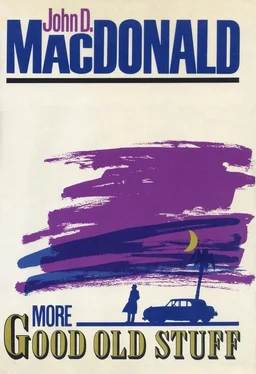
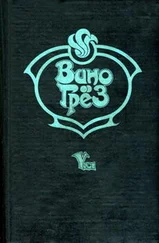
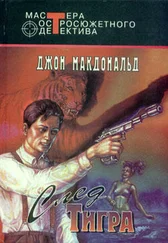
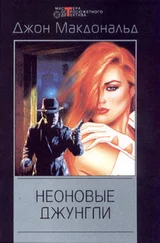

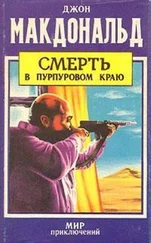



![Джон Макдональд - Wine of the Dreamers [= Planet of the Dreamers]](/books/430039/dzhon-makdonald-wine-of-the-dreamers-planet-of-thumb.webp)

